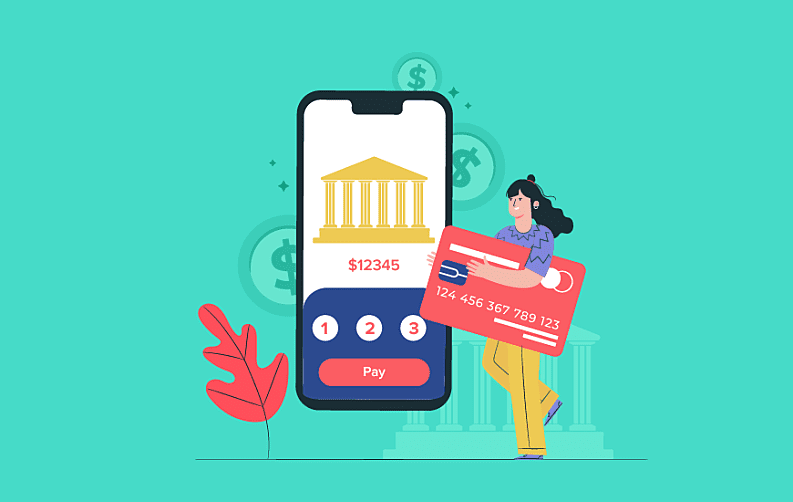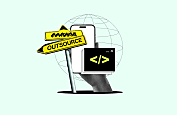
Notwithstanding the reduced growth of the overall business world amidst the pandemic, there has been a consistent rise in the usage of financial applications. With the development being mostly handled from remote homes, virtually, you could almost sense the financial institutions are keen on chafing their tech-arms.
A mouthwatering prospect of picking up high payment projects presents itself to financial app development companies, and who knows even freelance financial app developers. In this miniaturized guide, you’ll learn of possible approaches to tackle the recruitment cycle and hire a fintech app developer i.e. the best in its class. When hiring a fintech app developer, it's crucial to ensure they have expertise in eWallet app development. Look for a developer with a strong portfolio, understanding of security protocols, and experience in creating seamless, user-friendly interfaces.

Must-Know Fintech Applications for Financial App Developers
Right before we jump to the steps to be followed to hire a finance app developer, it’ll be better if you gained an overview of the domains fintech is being deployed into. Doing so shall open your market-view to new possibilities, i.e. if you haven’t already done preliminary research. Technology is being implemented at an unprecedented scale in financial service sectors such as capital markets, insurance, remittance, risk management, and asset management to name some.
1. Digital Lending & Credit
Loan sanctioning is traditionally bogged down by stringent procedures and protocols. But the process doesn’t have to be an endless back and forth between the bank and the loan seeker. Crowdfunding platforms have emerged as the new source to garner much-needed finances in considerably short timelines. The idea circumvents banks and opens new opportunities for people to avail immediate credits at competitive interest rates. It doesn’t end there. You can innovate deals by paying off the debt in equity or even factory outlet merchandise (if that applies). The way you structure a deal is totally up to you.
2. Online Banking
The aim of modernized banking is to digitize banking services and empower customers to operate remotely with as little red tape as possible. That is what the mobile banking trends point to. Services like online transfers, new account opening/monitoring, and wealth management are just an internet connection away thanks to Financial technology.
3. Insurtech
It refers to emerging technologies that are available to insurers to maximize savings and mitigate wasteful expenses from the value chain. A fintech app developer must take all the necessary steps to acquire experiential prowess to operate with technologies like Artificial Intelligence, Machine Learning, etc.
4. Instant Cross Border Payment
With the advent of blockchain technology, the processing time for international payments can be near-real-time. For intra-national transactions, Immediate Payment Services (IMPS) is the new thing. Not to mention, financial apps that offer digital wallets that are doing away with the need to even carry your wallet in the first place.
5. Online Trading
This was arguably one of the first financial domains to witness the onset of technology. Financial instruments such as equities, securities, futures, options can be bought and sold online globally due to which fintech app development companies have duly reacted by expanding their expertise and recruiting talent capable of incorporating fintech in trading. As a result of which self-help apps for trading are gaining momentum.
6. Personal Finance
Gone are the days of paper trails stockpiling customers for a modicum amount of money. Mobile-friendly platforms offer apps capable of educating beginners to save more and invest wisely. Long story short, the role of financial advisors has been shifted to automated chatbots that work 24/7 made ostensibly potent by self-learning algorithms that can help investors make money (from money).
Skills of Elite Financial App Developers
Before you hire a fintech app developer, it is an absolute must to cross-examine them. The aim of this preliminary competency test is to demarcate the technologies that the finance app developer is hands-on with. Below we list essential services that forward-looking financial app development companies must inculcate in their value offering:
1. Blockchain
Digital ledgers have come of age in the last decade with business applications offering them the much prophesized qualities of immutability, transparency, trackability, and above all, credibility. Blockchains require an interplay between multiple programming languages and working principles due to which only skilled blockchain developers should be trusted with such projects. A specialization in working with platforms like Ethereum, and hyperledger is a big plus. That said, equally important is prior experience in cryptography, data structures and smart contracts.
2. Big Data Analytics
Considering the variegated sources of data collection that exist in financial businesses, there remains untapped data that can and must be utilized to reveal business-related trends. This includes processing spending patterns to predict user behaviour and training theft-resistance software to ring the alarm bells in dubious circumstances. Similarly, a rich data history can be statistically mapped to create predictive models that objectively demonstrate patterns in user habits.
3. Robotic Process Automation
Financial application development involves a lot of automation. Therefore, developers must have the know-how to mechanize as many repetitive tasks as possible. A few places to begin could be creating chatbots, the ones that improve mobile UX, as advisors with round the clock availability. Compliance management is another area where regulatory guidelines could be fed into the system and there on activating the same to tighten loose ends.
4. Artificial Intelligence & Machine Learning
The leading AI developers see it as their aim to operationalize self-learning, improving Artificial Intelligence that would one day attain general intelligence. This is a recurring theme of AI-trends in the industry. But till such time, you need level-headed engineers to architect solutions with some semblance of automation. This should be one of the top criteria before you hire a fintech app developer.
Streamlining Recruiting of a Finance App Developer
We are halfway through our mini-guide and have so far discussed functional aspects to hire fintech developers of an undisputed caliber. It’s time we highlighted workday challenges that often come, unwelcomed, and if left unmended, could potentially give you sleepless nights.
1. Know Your “Why”
In practice, you should have a clear understanding of the market gulf that you plan to step in and fill. Carving out the mercurial details of your financial app and its underlying theme should require no second guesses. Some of the questions that align you with the right thought process could be on the following lines:
- What user-need do you aim to resolve that cannot already be met by existing solutions in the market?
- What is the market size of this prospective audience?
- How replicable slash patentable is your product?
- In the current scheme of things, do you even see this “thing” taking off the ground?
2. Identify Technological Enablers
A no brainer. How would you roll business projectiles without the requisite technological means? There are three variables to this equation namely the operation system, the database, and the front/back end infrastructure. Ask yourself the following to establish a clear roadmap:
- What is the modern standard for tech stacks?
- What is the industry opinion/critical review on the same?
- Is the demand and supply for such a stack well maintained?
- How strong is the community for such technologies? (e.g. there are 7.1 million Java developers in the world)
- Would the technologies support plans for expansion if the need arises?
3. Signal the Structure of Your App
This could happen once you have identified the problem statement. Just so we are clear, the best fintech apps fall in either of the following categories:
- They either solve multiple problems for a niche/elite population
- Or, they solve one problem for the millions of masses.
Category classification will help you define the app architecture. Here’s a set of questions to keep your night lamp burning:
- Name 5 problem statements your fintech app will solve
- Will all the mission statements need parallel addressing or can it be phased out?
- What would be your monetization strategy e.g. premium, freemium, etc.?
- How deeply linked is the project cost with app specifications?
4. Mete Out the Perfect User Experience
Experts continue to debate what is grandma's recipe for a flawless user experience. Answer - it’s complicated. Something as subjective as the UX rests on the standard defined by the creators of the fintech app. The following should help you straighten the rough edges out:
- Which platforms will the mobile app run on?
- What is the (unofficial) UX benchmark for such apps within the industry?
- Is the design intuitive enough to broaden user engagement?
5. Data Privacy & Security
Federal organizations globally haven’t the same appetite for applications that leak data that they used to earlier. Their easiest way out was to enact and enforce stringent data privacy laws that put user interest at the forefront and app ideators on their toes. Fintech apps collect an appreciable amount of user data that includes critical information from blood groups to financial history. Therefore, implementation of standard cybersecurity tips is the least that people will expect. Before setting your mind about a particular security apparatus, ask the following questions:
- Does your app blockade dubious in-app behavior?
- Is the code amply power-packed to prevail over data thefts?
- Have the measures, deemed non-negotiable by statutory authorities, been implemented to effect?
6. Should you Partner with Freelancers?
Virtual collaborations are the new normal, be it relationships or business. Nevertheless, it comes with strings attached and often leaves hard lessons learned in its wake. Experts operating in an individual capacity can be onboarded rather easily but stories of a mid-way fallout or deadline disregard are all too prominent. Ask the following questions:
- How can you guarantee that deadlines are met?
- What will be the mode of payment and how often?
- What standards will dictate an ethical yet remote collaboration?
7. Partnering with Enterprise Financial App Developers
This is a good problem to find yourself grappling with. Entrepreneurs with fintech app ideas can and must explore their choice with suitable enterprise app developers. Websites like the one you’re on (MobileAppDaily, duh) offer immense prospects for partnerships. They have dedicated reportage on the best and most experienced financial app developers that meet international standards of professionalism. While doing so the following questions could further help you handpick the best options:
- What communication channels will be in place for uninterrupted messaging?
- How would you define deadline default clauses and in what way recompense has to be paid?
- What is the tech stack specialization of the fintech software development companies?
- What does the market reputation spell?
Go from Zero to One & Develop Your Financial App
We’ve found that the ideal players imbibe the following aspects of software development to a tune of satisfaction savored by most customers.
1. Emphasize on Agile Development
It is an open secret. The most successful software development companies in the USA and other corners of the world want to (or already have) go lean on their business processes. It is estimated, about 71% of businesses have adopted this methodology with 61% of them registering profits. Throughout the project timeline (that is cut half thanks to agile mechanisms) the workforce endures to innovate product design for faster deliveries.
Unlike in the other SDLC methods, troubleshooting and debugging does not delay product delivery, only improves it. If you have promising fintech app ideas, look for someone that does the heavy lifting for you than make you do it.
2. Analyze Fintech Portfolio
Whoever you plan to dance with, there should be synergy and that will be ensured if the end-to-end experience is one without much aberrations. Have a take on the fintech products already developed by such software development companies. How sound are they technically, legally, ethically. What was the reception like? Is it possible for you to contact the clientele and dig up dirt?
For a while you’ll have to turn yourself into a sleuth but do that because that’s what is necessary.
3. Cyber Security
We’ve tried to raise a flag earlier so you know how crucial the security of your app is. Maleficent actors will try to sabotage your operations and look for backdoor openings. The four levels at which cyber threats are most common are:
- Source code
- Network connections
- Encryption techniques
- In-house data protection
Professionals with the ability to create finance apps should make sure the basic level online security covers all the factors mentioned above.
4. After Sales Support + Quality Control
Apps are like cars, they need regular servicing and greasing to run like beasts. The level of after sales support is the oiling your app would need to ward off any corrosion and aim for the sky. When contracting fintech app developers consider the following:
- The extend of services includes after app delivery
- Is App Store optimization an ongoing part of the process?
- Who will own the final source code?
Quality control, testing and maintenance of the app has to be part of the deal. If it is not, continue your search.
5. Flexible Contracting
State of the art enterprises don’t sell themselves short. They usually have a minimum budget for undertaking a project. But on an industrial level, there can three models for hiring such professionals:
- Hourly compensation - the vendor is compensated for the resources they allocate on an hourly basis.
- On-site Developer - the human resource is hired for the stipulated development time and works dedicatedly on-site with you on your idea.
- Fixed Budget - the payable amount is agreed in advance and billed as per mutual understanding.
There’s More to Financial App Development
The process to shortlist the right candidates to associate your enterprise identity with is a time consuming one. It is easy to lose track of the sight between a galore of ads and self-glorifying website slogans. What you need is a refined, sorted list of developers, vetted to the core and certified by experts.
That’s what we do at MobileAppDaily. Our coverage includes major portions of the US, Europe and now, Asia so you could make a swift choice and hire your ideal developer.

Sr. Content Strategist
Meet Manish Chandra Srivastava, the Strategic Content Architect & Marketing Guru who turns brands into legends. Armed with a Masters in Mass Communication (2015-17), Manish has dazzled giants like Collegedunia, Embibe, and Archies. His work is spotlighted on Hackernoon, Gamasutra, and Elearning Industry.
Beyond the writer’s block, Manish is often found distracted by movies, video games, AI, and other such nerdy stuff. But the point remains, If you need your brand to shine, Manish is who you need.













